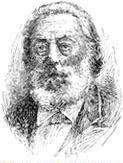Senior Sachs
Senior Sachs (b. Kėdainiai, Kovno Governorate, June 17, 1816; d. Paris, November 18, 1892) was a Russo-French Hebrew scholar.

Childhood and Education
Senior was raised in Žagarė, Kovno Governorate, where his father, Tzemach Sachs, was appointed rabbi when Senior was one and one-half years old. Senior studied Hebrew and Talmud under his father's tutelage, and while still a boy, manifested a predilection for Hebrew literature. He became acquainted with Joshua Klein, parnas of the Kėdainiai community, who furnished him with Haskalah books, including the works of Erter. Erter's writings so impressed Sachs that he considered immediately moving to Brody in order to study under him, but Sachs' early marriage, in accordance with the custom of that time, prevented him. Instead, Sachs studied for one year on a scholarship in the Wasilishok bet ha-midrash and taught for a year in Dubno before moving to Brody (c. 1839). In Brody, Erter assisted Sachs in finding employment teaching Hebrew, and Sachs studied German and Syriac, and devoted the greater part of his time to reading scientific and philosophical works.
Early Vicissitudes
Sachs remained two years in Brody, and while there wrote an article in Hebrew on Russo-Hebrew scholars and on the education of the Jews in Russia; this he sent to Jost, who translated it into German, and published it in his Annalen (1840, Nos. 4-10), omitting, however, the author's signature. His parents having requested him to return home, Sachs set out on his journey, but, having no passport, was arrested on the Russian frontier. He was brought to Kremenets, where he was thrown into prison, remaining in confinement five months, when he was liberated through the efforts of Isaac Baer Levinsohn. Sachs stayed at Zhagory six months, when he was invited to teach at Raseiniai, where he remained till the end of 1843. At length he went to Berlin (1844), where he entered the university, attending particularly the lectures of Schelling and Althaus. In 1856 Sachs was invited to Paris by Baron Joseph Günzburg to become his private librarian and the tutor of his children.
Works
In Paris Sachs displayed great activity in various branches of Hebrew literature, but as he occupied himself with different subjects at one and the same time, most of his works remained unfinished.
While in Berlin he had begun to edit literary periodicals, the first of which was Ha-Teḥiyyah, treating chiefly of medieval religious philosophy. Only two numbers were issued, the first in 1850 and the second in 1857. In 1850 Sachs edited also Zunz's Ha-Paliṭ, an index of valuable Hebrew manuscripts, with biographical notes on some of the authors. Of his Ha-Yonah only one number appeared (Berlin, 1851); it contains among other things an article by Slonimski on the Jewish calendar according to the ancient Talmudists. Sachs then undertook to continue the publication of the Kerem Ḥemed, editing vols. viii. (Berlin, 1854) and ix. (ib. 1856). His other works are:
- Kanfe Yonah, a supplement to Ha-Yonah (ib. 1858 ?)
- Le-Yom Huledet (Paris, 1859), a pamphlet on the anniversary of Mathilda Günzburg's birth
- Ḳikayon Yonah (ib. 1860), an announcement of the continuation of Ha-Yonah, containing, besides the prospectus, literary essays
- Ben Yonah (ib. 1860), a rimed prospectus of Ha-Yonah
- Sefer Taggin (ib. 1866), a midrash, attributed to Rabbi Akiva, on the crowns of the letters ("taggin"), edited with an essay on the age of this work and also on the Sefer Shimmusha Rabba and Otiyot de-R. Aḳiva
- Reshimah (ib. 1866), a catalog (unfinished) of the Günzburg library
- Shire ha-Shirim Asher li-Shelomoh (ib. 1868), the poems of Ibn Gabirol revised, punctuated, and commentated by the editor (this work has also a French title, Cantiques de Salomon ibn Gabirole [Avicebron])
- Ḥidot R. Shelomoh ben Gabirol (in Oẓar ha-Sifrut, iv. 90-111), Ibn Gabirol's riddles with solutions and explanations.
Sachs also researched and uncovered the wrongful attribution of twenty-one philosophical works of Solomon ibn Gabirol to the biblical King Solomon.[1]:xxx
Jewish Encyclopedia bibliography
- I. S. Fuchs, in Ha-Maggid, xxxv., No. 26;
- I. Goldblum, in Keneset Yisrael, i. 833 et seq.;
- idem, in Oẓar ha-Sifrut, iii., part 4, p. 97;
- Jellinek, in Jüdisches Literaturblatt, xxi. 192;
- I. Lévi, in R. E. J. xxvi. 157;
- M. Schwab, in Arch. Isr. liii. 374;
- N. Sokolow, Sefer Zikkaron, p. 42;
- Zeitlin, Bibl. Post-Mendels. pp. 326 et seq.
Notes
- Davidson, Israel (1924). Selected Religious Poems of Solomon ibn Gabirol. Schiff Library of Jewish Classics. Translated by Zangwill, Israel. Philadelphia: JPS. p. 247. ISBN 0-8276-0060-7. LCCN 73-2210.
References

External links
| Wikimedia Commons has media related to Senior Sachs. |
- Jewish Encyclopedia article for Senior Sachs, by Herman Rosenthal and M. Seligsohn.